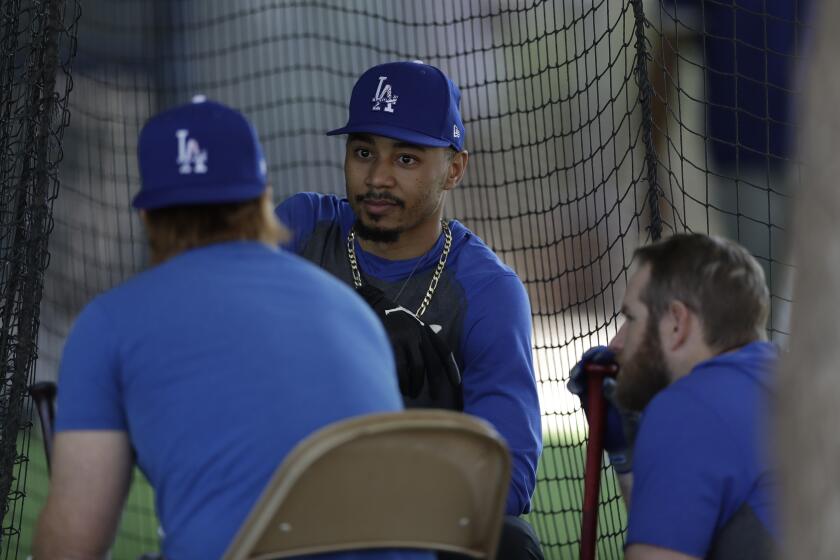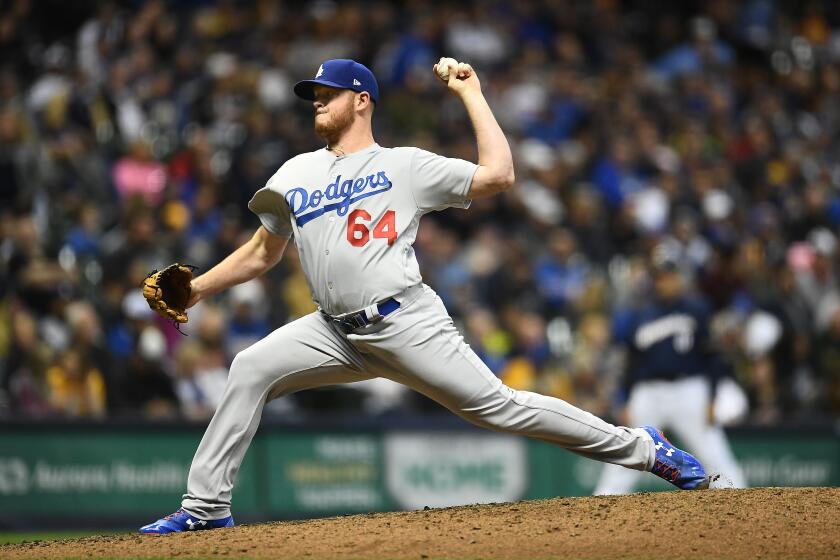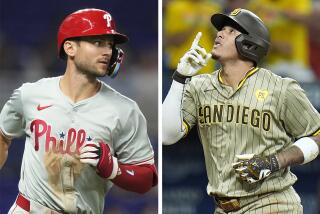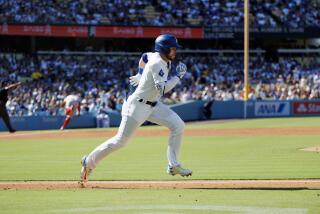Zach McKinstry goes from slap-hitting afterthought to Dodgers prospect with pop
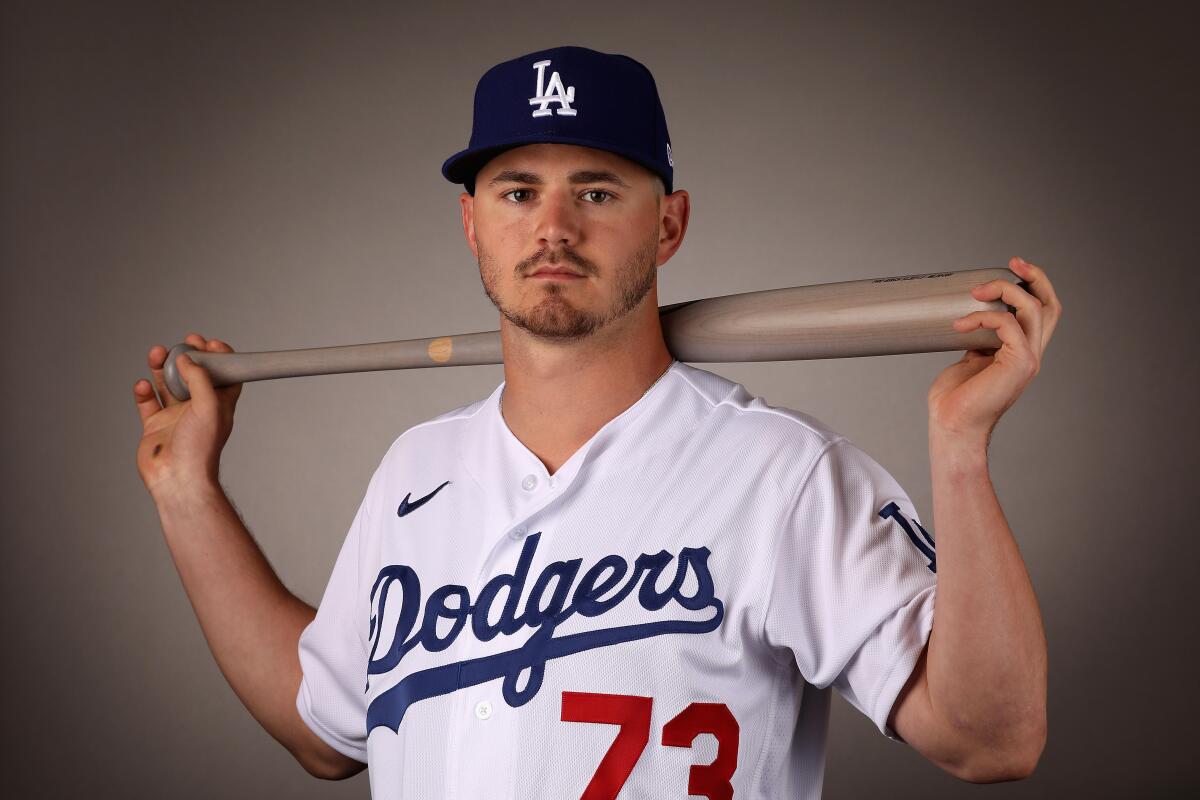
- Share via
SURPRISE, Ariz. — For the final stretch of their 2019 season, the triple-A Oklahoma City Dodgers employed the most productive duo of middle infielders in the Pacific Coast League.
The second baseman batted .392 with 13 home runs in 49 games. His name was Gavin Lux and he was cementing his status as one of baseball’s premier prospects before getting called up to the majors in September.
The shortstop, promoted from double-A more than a month after Lux, batted .382 with seven home runs in 26 triple-A games. His name was Zach McKinstry and he wasn’t a prospect. He was, until last season, an afterthought pushed to the side for peers with flashier pedigrees and tools.
“They’re very similar,” said infielder Edwin Ríos, who played with both players last season. “One’s a prospect and the other isn’t.”
While Lux’s razing of the upper minors last season vaulted his standing to consensus top-five prospect across the sport, the 24-year-old McKinstry’s performance produced its own leap.
He morphed from roster filler drafted in the 33rd round in 2016 to a player the Dodgers believe will debut in the major leagues in 2020 and become a regular contributor in the future. The Dodgers placed him on their 40-man roster during the offseason and he’s capitalized on opportunities this spring, again impressing club officials with his versatility and headiness.
Dodgers right fielder Mookie Betts didn’t report to spring training on Saturday because of a stomach ailment. He could be back in the lineup Monday.
McKinstry is the super-utility type the Dodgers value in the same bucket as Chris Taylor and Kiké Hernández. He’s played second base, third base, shortstop, left field and right field in the Cactus League after reporting to spring training with six gloves broken in. He said he was told he’ll get some time in center field soon. On Sunday, he went one for two as the Dodgers’ designated hitter against the Texas Rangers to push his batting average to .375 with two home runs, a triple and a double.
“He’s really performed himself into being a real guy as far as being on the roster and being one of the prospects,” Dodgers manager Dave Roberts said. “You really pull for guys like that. He’s a baseball player — and I use that adjective a lot. He can play anywhere on the diamond, he’s an intelligent player. He conducts really good at-bats. He’s a guy that I wouldn’t be surprised if we saw him sometime this year.”
McKinstry was never a prospect. He was a prolific high school player in Fort Wayne, Ind., where he nearly broke the state record for triples in a season, but wound up attending Central Michigan where realistic major league aspirations are as dead as the winters. He was the starting shortstop from the moment he stepped on campus and appeared in 118 games across two seasons, but never hit a home run.
He was small and scrawny. His tools didn’t pop eyes. He was, as he described it, a slap hitter, and slap hitters from the Midwest don’t excite scouts. He slipped to the 33rd round as a draft-eligible sophomore in 2016 and wavered on signing with the Dodgers. He played in one game in the Cape Cod League that summer before a friend’s mother died and he returned home. He then decided to sign for $100,000 two days before the deadline.
His status within the organization became apparent immediately; when he was assigned to Class-A Great Lakes, he played third base to get in the lineup because the Dodgers had Omar Estevez and Brendon Davis, two highly regarded prospects, in the middle infield.
“I got there and I was like, ‘If I want to play, I got to play third,’” McKinstry said. “So it’s about the at-bats and being in the game.”
Dodgers reliever Caleb Ferguson is developing a hard slider to complement his fastball and slow curveball, so that eventually he can move to the rotation.
From there, McKinstry bounced around the infield, carving playing time wherever he could find some, and added outfielder to his résumé in 2018. He reached double-A that season, but struggled, batting .193 with a .543 on-base-plus slugging percentage in 25 games for Tulsa.
The team won the Texas League championship, but McKinstry was relegated to the bench in the playoffs. His playing time was limited to one pinch-hit appearance in eight games. He flied out in Game 2 of the championship series. That was it.
“I didn’t play,” McKinstry said, “because I sucked.”
So McKinstry hit the road when the season ended. Home was north, in Indiana, but he traveled 1,000 miles west from Tulsa with a friend until they reached Camelback Ranch. Arizona would be his home for the offseason. His winter in the desert was to ensure he wouldn’t suck like that again.
He spent his days putting on muscle and working with members of the Dodgers’ hitting staff, led by hitting coordinator Aaron Bates, on his mechanics. The goal was to remain consistent as the pitching improved while increasing his power to become a gap-to-gap hitter with enough pop for the occasional home run. The results were promising from the start of the 2018 season with Tulsa, where he batted .279 with 12 home runs in 95 games before reaching triple-A.
McKinstry hit 19 homers in 2019 across the highest two minor league levels after hitting only 11 homers in his first three minor league seasons.
“Really, last year, when we played in Tulsa, where we started the year together, I was like, ’Damn he can play. He’s a really good player,’” recalled Lux, drafted 32 rounds ahead of McKinstry in 2016. “He’s a grinder, he grinds out at-bats. He’s a pro, the way he goes about his business. And he’s fun to play with in the middle of the field, too.”
After tearing up the Pacific Coast League together last season, the two might share the middle infield at Dodger Stadium in 2020, a far-fetched possibility just a year ago.
More to Read
Are you a true-blue fan?
Get our Dodgers Dugout newsletter for insights, news and much more.
You may occasionally receive promotional content from the Los Angeles Times.

